 |
|
Here and There introduces art, artists, galleries and museums around Japan that non-Japanese readers and first-time visitors may find of particular interest. The writer claims no art expertise, just a subjective viewpoint acquired over many years' residence in Japan.
|
|
 |
|
|
 |
 |
The Japan Media Arts Festival Gets Globalized
Alan Gleason |
 |
 |
Pendulum Choir by Cod.Act (Michel and André Décosterd),
Grand Prize, Art Division; © Cod.Act. Photo: Xavier Voirol |
The 16th Japan Media Arts Festival will hold its Exhibition of Award-winning Works from 13 to 24 February at the National Art Center, Tokyo and several other venues in the Roppongi neighborhood. Sponsored by Japan's Agency for Cultural Affairs, the annual event is an ambitious undertaking that somehow seems to have flown under this reviewer's radar until this year, when (disclaimer!) I was asked to coordinate the English translation of the festival catalog. First of all, then, I must tip my hat to the festival for even contemplating the production of a fully bilingual catalog, an effort that in itself makes the event more friendly to overseas visitors than most art exhibitions in Japan.
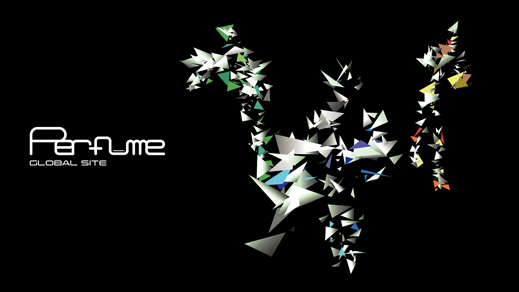 |
Perfume "Global Site Project"
(Daito Manabe, Mikiko, Yasutaka Nakata, Satoshi Horii, Hiroyasu Kimura),
Grand Prize, Entertainment Division;
© Rhizomatiks Co., Ltd. + Amuse Inc. + Universal Music LLC |
Though open to submissions of work from anywhere, the festival has had a homegrown look for much of its history, but this is quickly changing. This year, a whopping 1,502 entries out of a total of 3,503 came from artists based in 71 countries outside Japan, an all-time high for the festival. More significantly, the Grand Prize winners in two of the four divisions (Art, Entertainment, Animation, and Manga) are foreign works. Given that the sponsors of the festival, as well as its jurors (all Japanese), appear to view media arts per se as a made-in-Japan phenomenon (an assumption that certainly holds true where animation and manga are concerned, and arguably in the entertainment categories of games, gadgets, and robots as well), this is a significant acknowledgement of the degree to which foreign artists are giving domestic counterparts a run for their money, even in such bastions of Japanese superiority as manga and animation. Granted, the very definition of "media arts" remains a bit fuzzy, but it appears to involve a lot of stuff that moves: video, animation, digital, and web-based work in particular.
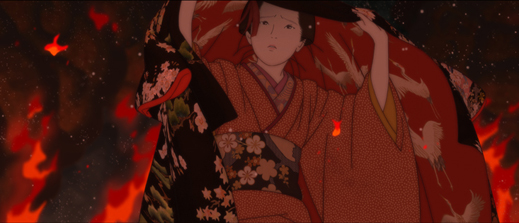 |
COMBUSTIBLE by Katsuhiro Otomo,
Grand Prize, Animation Division; © SHORT PEACE COMMITTEE |
The Manga Grand Prize winner is in fact a French bande dessinèe (BD), Les Citès Obscures (Cities of the Fantastic) by Benoît Peeters and François Schuiten, that has been in serialization for years, deservedly garnering numerous accolades and prizes along the way. What prompted its recognition at this festival was the work's publication in Japanese for the first time. Most telling, however, was the fact that in their catalog essays, several Manga jurors note that this was one of the few prizewinners they agreed on unanimously; heated debate evidently ensued over the candidates for the other awards (Excellence and New Face) and jury selections.
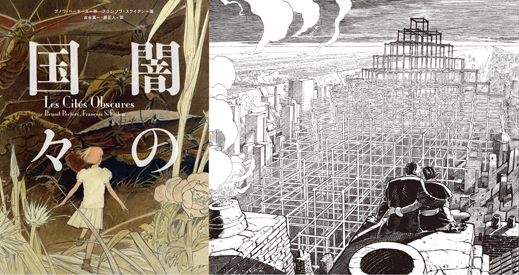 |
Les Cités Obscures (Cities of the Fantastic) by Benoît Peeters and François Schuiten
(translated by Shin-ichi Furunaga and Masato Hara),
Grand Prize, Manga Division; © 2008, 2009, 2010 Casterman, Bruxelles. All rights reserved |
Consensus was also quickly achieved, it appears, on the Art Grand Prize winner, Pendulum Choir by the Swiss unit Cod.Act (Michel and André Décosterd, who won the prize in 2010 as well. This is a sublimely eerie installation in which members of a male chorus sing an original composition while their bodies sway back and forth on hydraulic stilts. The Grand Prizes for Animation and Entertainment went to less surprising choices: the former to Combustible, a lovely, Nihonga-style animated short film about 18th-century Edo by renowned Akira auteur Katsuhiro Otomo, and the latter to Perfume "Global Site Project", a sprawling, web-based, fan-interactive enterprise featuring the pop-idol girl group Perfume.
The jurors' willingness to view works from abroad through an unbiased lens is admirable, though the increasingly globalized audience and flavor of the festival have not sunk in entirely, it seems. Jury essays and roundtables in the catalog include comments about the relative superiority or inferiority of Japanese works vs. those from overseas, inadvertently revealing that a certain insularity has not vanished entirely from the screening process. One juror does allude, however obliquely, to the need to "reevaluate" the makeup of the juries in the future -- perhaps by adding a non-Japanese juror or two? That said, there's no denying that the domestically-produced entries, in manga and animation especially, are an impressive lot. Indeed, the Japanese works seem overall to be more adventurously eccentric, and less slickly commercial, than their overseas counterparts.
The twelve-day exhibition will introduce the 32 works that won this year's awards (eight from each division), as well as a number of the runner-up Jury Selections (which total some 30 per division), offering an exhaustive and generally stimulating overview of the media arts, whatever they may be, both at home and abroad. Hopefully in years to come that geographic distinction will come to be viewed as arbitrary and insignificant by viewers and jurors alike.
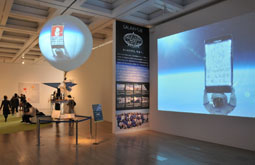 |
|
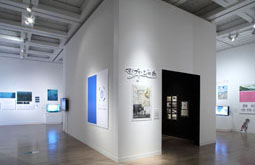 |
|
|
|
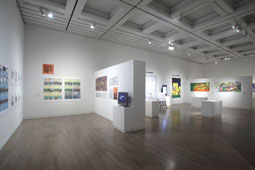 |
|
Installation views of last year's Exhibition of Award-winning Works at the 15th Japan Media Arts Festival, February 2012
All images courtesy of the Japan Media Arts Festival |
|
|

|
16th Japan Media Arts Festival Exhibition of Award-winning Works |
 |
The National Art Center, Tokyo and other venues |
 |
13 - 24 February 2013 |
 |
7-22-2 Roppongi, Minato-ku, Tokyo
Phone: 03-5777-8600
Hours: 10 a.m. to 6 p.m. (to 8 p.m. Fridays); closed Tuesdays
Transportation: Direct access from Exit 6, Nogizaka Station, Tokyo Metro Chiyoda Line, or a 5-minute walk from Roppongi Station, Tokyo Metro Hibiya Line and Toei Oedo Subway Line |
 |
|
 |
|
|
|
|
 |
Alan Gleason
Alan Gleason is a translator, editor and writer based in Tokyo, where he has lived for 25 years. In addition to writing about the Japanese art scene he has edited and translated works on Japanese theater (from kabuki to the avant-garde) and music (both traditional and contemporary). |
|
|
|
 |
|